
Monopoly is a real estate themed multiplayer tabletop board game that has, over the years, become a household name around the world.
 With just nearly a century of history, the relatively contemporary board games stands near the top as one of the most sold board games of all time, along with the likes of legends such as Chess, Checkers and Backgammon, all of which are literally thousands of years old. However, as ubiquitous as the game is, much of it is misunderstood, from its much maligned rules to its warped origins.
With just nearly a century of history, the relatively contemporary board games stands near the top as one of the most sold board games of all time, along with the likes of legends such as Chess, Checkers and Backgammon, all of which are literally thousands of years old. However, as ubiquitous as the game is, much of it is misunderstood, from its much maligned rules to its warped origins.
Despite it still being one of the most sold games in the world, accounting for nearly a third of the world’s board game sales, and essentially being typically understood as a bald faced celebration of capitalism, Monopoly was created in 1935, during the era of America’s Great Depression.
American inventor Charles Darrow was given sole credit for the game of Monopoly by the Parker Brothers toy manufacturing company but this was far from the full story.
The true first instance of a real estate themed tabletop board game was created several decades prior, in 1903 by American antimonopolist Lizzie Magie.
Patented in 1904 as the Landlord’s game, Magie’s prototype holds many of the trademark characteristics and rules of the Monopoly game we know today, including the square shaped game board with nine spaces on each side, set between corners for “Go to Jail” and “Public Park”.
Inequalities
Players need to roll dice in order to pace around the board, buying up properties and railroads or ‘monopolies’, while paying rent and taxes. Magie created the game as a tool to teach the inequalities in land ownership and taxation based on her Georgist economic ideologies. Even the classic Monopoly rule of earning $200 as you pass Go, which makes no real sense for what it is right now, was based on the ‘Citizen’s Dividend’ idea of Magie’s Gerogist ideology.
 While the popularity of “Landlord’s Game” was not insignificant, the game was largely shared informally by people creating their own game sets based on the rules and structure of Magie’s game.
While the popularity of “Landlord’s Game” was not insignificant, the game was largely shared informally by people creating their own game sets based on the rules and structure of Magie’s game.
It was a version of this informally created “monopoly game” that Charles Darrow came across while visiting a friend. Darrow requested his friends to write down the rules to the informal “Landlord’s Game”, which he used to create “Monopoly”.
The Parker Brothers company later bought the rights to the “Landlord’s Game” from Magie for $500. Charles Darrow would go on to become the first millionaire game designer in history, cited as the sole creator of “Monopoly”.
Currently, the game of Monopoly has shed all of its criticisms of capitalism and is now a straightforward and wholehearted celebration of it. Charles Darrow’s chance success built on the back of the woman who put all the real effort was heralded as the ideal situation.
The prime example of pulling yourself up by your bootstraps, living the American dream. Once the multinational conglomerate Hasbro acquired Parker Brothers in the 90s, Monopoly was turned into a global mega franchise, with over 300 editions and spin offs of it created for superficial cash grabs based on other mega franchises, such as a Harry Potter, Star Wars or Pokemon themed Monopoly boards.
Today, most of those playing Monopoly, children ages 8 and up, are not even likely to know what a monopoly even is, let alone what the original was meant to critique.
